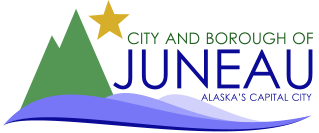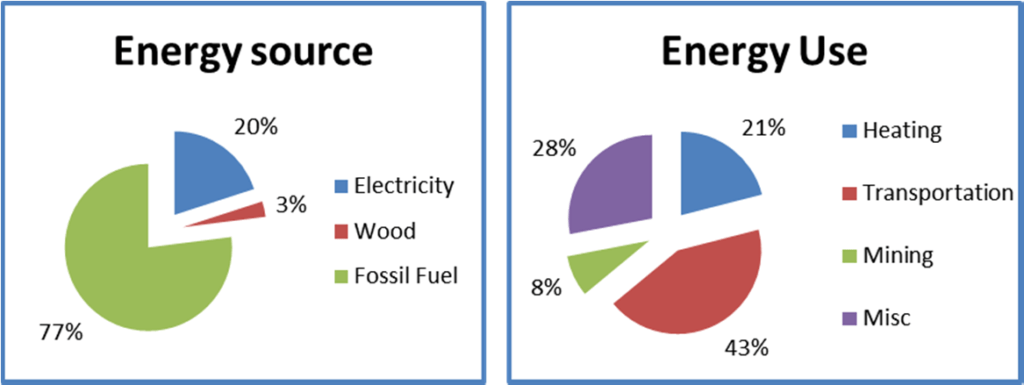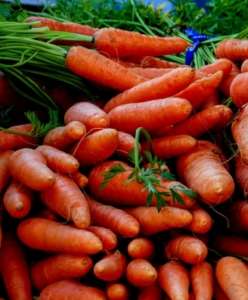Juneau Commission on Sustainability
The Duties of JCOS
To coordinate, propose, and promote sustainability initiatives among residents, businesses, government, and non-governmental agencies and educational organizations through education and outreach programs.
To make recommendations to the Juneau Assembly and CBJ Boards and Commissions on policies and programs that promote sustainability.
To research and apply for grants or other funds or gifts from public or private agencies for the purpose of carrying out any of the provisions or purposes of this resolution.
To serve as an advisory group to the CBJ in reducing greenhouse gas emissions to target levels as adopted by the CBJ Assembly.
To act as liaison between the public and the CBJ Assembly on sustainability related issues.
Current Agendas & Minutes
Click the button below to access the new CivicPlus system
for the current minutes and agendas.
Previous Meeting
History, Mission and Members
The Assembly created the Juneau Commission on Sustainability (JCOS) in 2007, with the current governing directives found in Resolution 2755. The mission of the JCOS is to promote the economic, social, environmental, and governmental well-being of Juneau and all its inhabitants, now and in the future.
The 9-member commission consists of nine public members, appointed by the Assembly, plus one member of the Assembly, and one Planning Commissioner.
The current Commissioners are:
Griffin Plush, Co-Chair
Marian Call, Co-Chair
Duff Mitchell
James Powell
David Teal
Jessie Barker
Laura Achee
Nick Waldo
Brennen McCulloch
Nina Keller, Planning Commission Liaison
Alicia Hughes-Skandijs, Assembly Liaison
The CBJ Staff Contact is Rose Evans, Administrative Office II in the Engineering & Public Works Department. Direct all inquiries about JCOS to her at 907.586.0800 ext. 4181 or [email protected].
Energy Use in Juneau
Juneau energy use interactive dashboard can be accessed here. It will give you address-specific information on the energy and GHG emissions footprint of buildings in Juneau.
The majority of Juneau’s energy comes from fossil fuels; however, almost all of Juneau’s electricity is produced by hydropower, a renewable resource.
Juneau has recognized that continued dependence upon fossil fuels is not desirable. As a result, the CBJ has developed a Climate Action Plan and the Juneau Renewable Energy Strategy (JRES). The Assembly supported these actions through Resolution 2593 and Resolution 2808.
The Juneau Renewable Energy Strategy
In February 2018, the CBJ Assembly adopted the JRES through Resolution 2808. The JRES recommends four primary strategies to achieve the 80% renewable energy goal. These include:
- CBJ Energy Management: Implement a CBJ energy management program to make the organization a leader in energy efficiency and adoption of renewable energy.
- Heating: Reduce Juneau’s dependence on fossil fuels for space heating.
- Transportation and Electric Vehicles: Reduce Juneau’s dependence on fossil fuels for transportation.
- Renewable Energy Supply: Support efforts to provide new renewable energy supplies for Juneau.
CBJ Energy Management
The CBJ spends about $8 million per year on energy. Adopting a formal energy management program, including tracking energy use and costs, implementing energy efficiency best practices, and implementing the recommendation of energy audits could result in substantial savings. Consolidating the CBJ vehicle fleet and converting to electric vehicles is another area of potential energy and cost savings. The CBJ could also provide examples and information to the public on opportunities for energy savings. These provide the mechanics for CBJ to lead by example.
Transportation and Electric Vehicles
Transportation is the largest (43%) use of fossil fuels in Juneau. Electrification of transportation provides a major opportunity to transform transportation to renewable energy, and Juneau already has one of the most rapid rates of electric vehicle adoption in the country. Other significant opportunities to reduce fossil fuel use include supporting energy efficient, compact, mixed use development, improving and electrifying the CBJ transit system, and supporting non-motorized transportation.
Electric Vehicle Resources
In 2014, several Juneau businesses began installing electric vehicle chargers. In 2015, the City and Borough of Juneau’s Assembly passed Resolution 2722 to express support for the advancement of electrified transportation vehicles. Since then, electric vehicle ownership has increased from less than 5 (in 2013) to over 300 (as of 2018).
To learn more about electric vehicle (EV) ownership in Juneau, including locations of charging stations, local EV incentive programs, and best practices for buying and maintaining your EV, check out the Juneau Electric Vehicle Association, the Renewable Juneau’s Electric Vehicle Information page, Plugshare and the work of the Juneau Economic Development Council’s Renewable Energy Cluster Group.
The Juneau Commission on Sustainability has helped educate and involve the community in the on-going discussion about expanding EV use in Juneau. You can view the video and presentation from the 2018 EV Sustainability Session here. If you would like to learn more about potential actions by the CBJ to advance plans for EV charging stations on CBJ property, see JCOS’s CBJ Electric Vehicle Parking and Charging Scenarios Factsheet.
Click here to learn more about CBJ’s EV’s, EV charging infrastructure, and electric buses.
Non-Motorized Transportation Resources
Juneau has 88 miles of bike lanes and 19 miles of shared-use paths. The city’s adoption of the 2009 Non-Motorized Transportation Plan helped the Alaska Department of Transportation improve bicycle facilities and create a Safe Routes To School plan for all Juneau elementary and middle schools. In 2011, the League of American Bicyclists designated Juneau a Bicycle Friendly Community.
- Basin Road/8th Street Parking Lot
- Marine Parking Garage
- Douglas Public Library
- Treadwell Arena
- Downtown Parking Garage
- Harris Harbor Parking Lot
- Twin Lakes Parking Lot
- Valley Transit Center
- Eagle Valley Center
- Mendenhall Valley Public Library
- Eaglecrest Ski Area
To learn more about activities promoting Juneau as a bike commuter friendly city, including maps, check out Juneau Rides.
Heating
Space heating accounts for about 21% of energy use in Juneau. Significant shifts to electric heat have occurred over the years, particularly when fuel oil costs were high relative to electric rates, so today almost 25% of Juneau homes are heated by electricity. In 2012, JCOS created a Juneau Space Heating Fuel Comparison Calculator to help individuals compare options for their home.
Heat Pump Resources
Heat pumps are increasing in popularity in residential, commercial, and public buildings in Juneau due to their ability to decrease energy costs. The City and Borough and Juneau have installed several ground-source heat pumps, and local air source heat pump installation and service companies for residential and commercial buildings have expanded significantly.
- JCOS Heat Pump Information Sheet
- Renewable Juneau’s Heat Pump Page
- The Cold Climate Housing Research Center’s Heat Pump Calculator
Wood Energy and Wood Pellet Stove Resources
Wood is estimated to provide approximately 3% of Juneau’s energy. The use of wood primarily provides space heating although more sophisticated systems are available that can also provide hot water.
- Alaska Wood Energy Development Task Group – Includes wood energy handbooks, energy calculators, and other resources
- Wood Energy for Residential Heating in Alaska: Current Conditions, Attitudes, and Expected Use – A study by the U.S. Forest Service’s Pacific Northwest Research Station
District Heating
Beginning in 2013, JEDC’s Renewable Energy Cluster Group began looking at opportunities to bring district heating to Juneau and other communities. In 2016, plans to develop a district heating facility were announced by Juneau District Heating.
Energy Efficiency and Conservation
Energy efficiency initiatives in Juneau exist for public buildings, private businesses, and residential buildings. For more information on energy efficiency in Alaska, check out these resources:
- Alaska Electric Light and Power Company: Provides information about energy and conservation.
- Renewable Energy Alaska Project: Provides information about energy efficiency, renewable energy projects and programs in Alaska, and identifies opportunities for action.
- Alaska Energy Authority: Renewable energy resource maps, reports, programs, planning, and financing information. Oversees the Alaska Renewable Energy Grant Fund.
- Alaska Center for Energy and Power (ACEP): The University of Alaska Research Center for applied research to lower energy costs and develop economic opportunities throughout Alaska.
- Alaska Energy Efficiency Partnership: Provides useful information for homeowners, building owners, professionals, and students on ways to be more energy efficient.
- Cold Climate Housing Research Center (CCHRC): Research and development of cold-climate building techniques and technologies, including energy efficiency and micro-generation renewable energy technology.
Renewable Heating Suppliers
- Alaska Hearth Products: 8600 Airport Boulevard, Juneau, Alaska 99801; (907) 789-1332; fax: (907) 789-5132
- Alaska Plumbing and Heating: (907) 209-6648
- All American Plumbing and Heating: (907) 789-1800
- Cameron Plumbing and Heating: 1850 Crest Street Juneau, Alaska 99801; (907) 789-2896
- Harri Plumbing & Heating Incorporated (Geothermal heat pumps): 809 W. 12th St. Juneau, AK 99801;(907) 586-3190
- Icehouse Refrigeration: (907) 523-2700
- Pacific Rim Mechanical (Pellet boilers): Haines, Alaska; 907-382-2068
- The Plumbing and Heating Company: (907) 789-3332
- Schmolk Mechanical Contractors: (907) 225-6648
If your business offers renewable heating options and you would like to be listed, please contact CBJ staff liaison Dianna Robinson at [email protected].
For more information on Energy in Southeast Alaska, check out these additional resources:
- The Renewable Energy Cluster Working Group: A Southeast initiative sponsored by the Juneau Economic Development Council, with specific renewable energy action initiatives, education, and outreach.
- Renewable Juneau: A non-profit organization providing information, education and advocacy to support local climate solutions– renewable energy, heat pumps, electric vehicles, and building efficiency – in Alaska’s capital city.
- Draft Southeast Integrated Resource Plan: The Alaska Energy Authority’s draft regional plan creates a pathway for strategic, community‐ focused, and data driven decisions that stretch public dollars and protect investments in energy infrastructure.
- Southeast Alaska Energy Demand study: The Juneau Economic Development Council’s energy demand study.
Recycleworks Program
The City and Borough of Juneau’s Recycleworks Program is tasked with developing and implementing recycling, household hazardous waste, junk vehicles, and organics management programs, to protect the health and safety of our community and environment. They are guided by a 3-5 year Solid Waste Action Plan. To learn more about how to reduce, reuse, and recycle in Juneau, check out Recyclework’s resources:
Growing Food In Juneau
Community Gardens in Juneau
Southeast Alaska Gardening Tips and Tricks
- Gardening in Southeast Alaska
- Raised Bed Gardening
- Gardening with Row Cover
- Recommended Variety List for Southeast Alaska
- Growing Potatoes in Alaska
- Growing Rhubarb in Alaska
- Growing Carrots in Alaska
- Growing Garlic in Alaska
- Growing Brassicas in Alaska
Other Gardening Resources
- UAF Cooperative Extension Juneau Office
- Southeast Alaska Master Gardeners Association
- Juneau Garden Club
- Sitkavore Gardening Blog
Buying Local Food in Juneau
Juneau is continually expanding its offerings of access to locally sourced foods.
Food Markets and Resources
- Salt and Soil Marketplace
- Panhandle Produce
- Juneau Food Fair
- Saturday Market at Mendenhall Mall
- Sitka Local Food Network
- Southeast Alaska Watershed Coalition’s Community Food Sustainability Program
- Sustainable Southeast Partnership’s Food Security Program
Juneau Businesses Specializing in Local Foods:
Harvesting Wild Food in Juneau
Below are some resources about harvesting wild Alaskan foods in our region.
Foraging and Preparing Wild Plants
- Harvesting Alaskan Wild Plants
- Edible Berries and Mushrooms of Southeast Alaska
- Food-a-be: A Food and Foraging Blog in Southeast Alaska
- Common Edible Seaweeds in the Gulf of Alaska
- Mushrooms of Alaska’s National Forests
- UAF Cooperative Extension Publications – Includes a variety of publications on preserving Alaskan fish, game, berries, mushrooms, and more
- Alaska Sportfishing Information
- Alaska Hunting Information
Gathering, Hunting, and Fishing Regulations
Emergency Preparedness
Water
Water and Sustainability
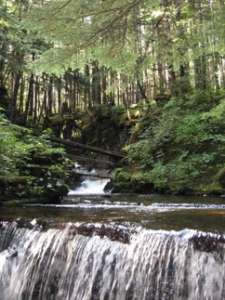 Water plays an essential role in our world, especially in Juneau – a place that averages over 110 inches of rain each year and relies on hydropower as its primary source of electricity.
Water plays an essential role in our world, especially in Juneau – a place that averages over 110 inches of rain each year and relies on hydropower as its primary source of electricity.
It may seem odd to think about conserving water in a place that has so much of this resource. However, water and sustainability isn’t just about “conserving” water, it’s also about knowing how much of an impact we have on our water supply. Our actions directly influence this resource and the other resources required to sustainability manage our water. For example, it takes a great deal of energy and infrastructure to process drinking water, as well as wastewater, around our community. Developing a better understanding of how we currently manage this process has the potential to lead to direct social and economic benefits.
Local Resources
- Juneau Watershed Partnership: Promotes community stewardship and the sustainable use of Juneau’s watersheds.
- Juneau Watershed Library: The Juneau Watershed Partnership has a resource library that includes areas such as hydrology, waterbody management plans, wetlands, water rights, and water quality.
- City & Borough of Juneau Water Utility: Provides information on Juneau’s water sources.
- CBJ Wastewater Information: Provides information on Juneau’s wastewater.
- Alaska Dept. of Environmental Conservation, Division of Water: Information about wastewater and storm water permitting, and non-point source pollution management.
- Alaska Dept. of Environmental Conservation, Division of Environmental Health: Information about safe drinking water and drinking water protection areas.
- Alaska Dept. of Natural Resources, Mining, Land & Water: Information on hydropower development and water reservation permitting.
Climate
Along with the rest of the world, Southeast Alaska is experiencing climate related changes. Our region has already experienced about a 3ºF increase in average winter temperatures over the past 60 years, with a decrease in annual snowfall at sea level from approximately 109 inches to 93 inches. In coming decades, Southeast Alaskan communities can expect warmer and wetter conditions, warming ocean temperatures, and ocean acidification, with affects on fisheries, impacts on transportation and infrastructure, and the economic costs of responding to climate impacts likely increasing over time.
For Juneau residents and visitors, the rapid retreat of the Mendenhall Glacier is a powerful reminder. Of particular concern are impacts to Juneau’s hydropower resources, and to salmon and other marine fish and wildlife that are important to our economy and recreation.
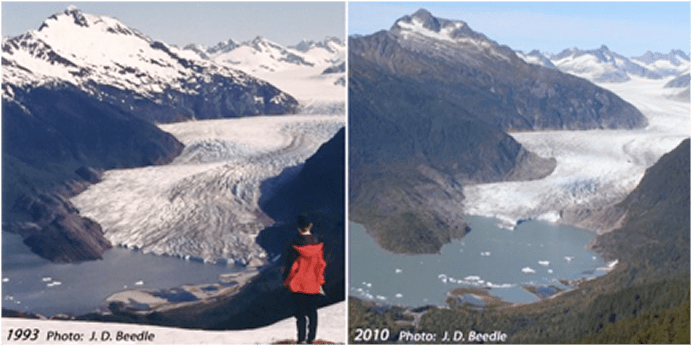
Photos courtesy J.D. Beedle: Left – Mendenhall Glacier, 1993. Right – Mendenhall Glacier, 2010
The community of Juneau is working to address climate change by both thinking and planning for expected changes (climate change adaptation), and taking action to reduce carbon emissions (climate change mitigation).
Climate Change Mitigation in Juneau
In order to better understand Juneau’s contributions to climate change, CBJ completed the 2007 CBJ Greenhouse Gas Emission Inventory, 2010 CBJ Greenhouse Gas Emissions Inventory, and 2021 Greenhouse Gas Emission Inventory.
In 2011, the Juneau Assembly adopted the Juneau Climate Action and Implementation Plan, which set a target of a 25% community-wide emissions reduction to be achieved by the year 2032. An associated Climate Action Manual provided guidance on CBJ Implementation of the Climate Action and Implementation Plan.
One of the major recommendations of the Juneau Climate Action Plan was for the City to develop a renewable energy strategy. The implementation of this recommendation, culminated the Juneau Assembly adoption in 2018 of the Juneau Renewable Energy Strategy.
Climate Change Adaptation in Juneau
Projecting impacts of climate change is an essential step for communities to better adapt. In 2007, a scientific panel conducted the study, Climate Change: Predicted Impacts on Juneau. Below are resources that further examine climate change impacts in the region and the state and make recommendations about adaptation planning.
- Regional Climate Projections: Southeast Alaska: This 2013 paper summarizes climate projections for Southeast Alaska
- The National Climate Assessment, Alaska: This website provides resources and summarizes the high level climate impacts in Alaska.
- The Alaska Climate Adaptation Science Center: This research center focuses on understanding the response of Alaska’s ecosystems to a changing climate to support resource managers and sustainable communities.
- Adapt Alaska: This website provides resources and shares stories about coastal communities in Alaska and how to adapt.
- Climate Change Adaptation in Southeast Alaska: This report summarizes the findings from a 2017 workshop focused on climate change adaptation strategies in Southeast Alaskan communities.
- “Juneau’s Changing Climate & Community Response, July 2022” – This report focuses on an overview of what specific climate change impacts Juneau is experiencing and predictions for the future.
Other Climate Resources
Headline Stories
- Report: Juneau’s greenhouse gas emissions down from 2010 to 2021
- Zero-emission air-source heat pumps are trending in Juneau
- Juneau secures funding for cleaner buses
- Survey will monitor cruise ship emissions in downtown Juneau this summer
- Sustainability presentation highlights heat pump usage
- City Sets Goal to be 80 percent renewable by 2045
- Visitor Industry Talks Sustainability
Sustainability Sessions
Click the links below to watch previous sessions.
October 2024 – Environmental Impacts of Cruise Ships
September 2024 – Bears & Trash
